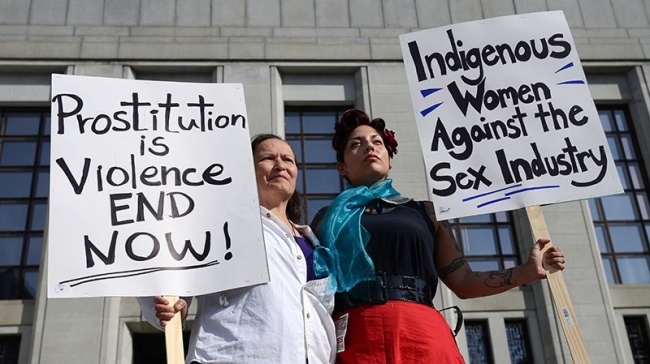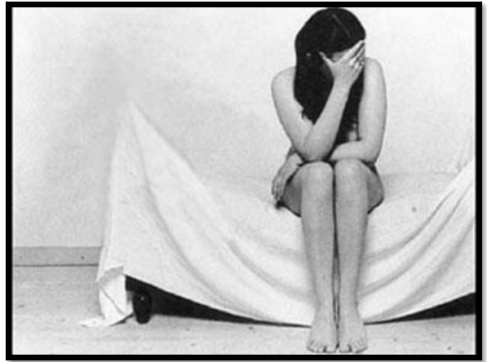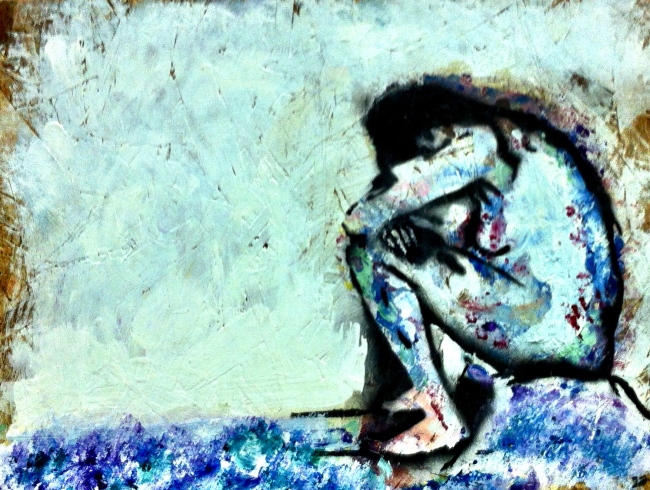gender violence
Victims Bill of Rights: An Open Letter from Victims of Crime
On April 3rd 2014 Canadian Prime Minister Stephen Harper announced legislation “to give victims of crime a more effective voice in the criminal justice system.”(Public Statement) I first heard of this legislation driving back from a meeting with women who are some of the very victims that Stephen Harper refers to. Listening to CBC Radio I heard lots of discussion about the new legislation but one thing stood out to me, one interviewee raised concerns that if victims have too many rights, they may slow down the justice process. Considering the meeting I just came from I wondered what those women would say about a fear of victims having too many rights! As a person who has been victimized by sexual abuse I would like to write an open letter to policy makers, politicians, lawyers, law enforcement officers around the globe to express what rights for victims of sexual violence would look like. Whatever country you call home, do you know how the legal system treats victims of sexual crimes?
“Dear Policy Makers, Politicians, Lawyers and Law Enforcement Officers, while I appreciate the legislation you have put forward for victims rights in the criminal justice system, I want you to know this doesn’t provide much hope for victims of crime like myself. I write this letter speaking as someone who has been a victim of sexual abuse and has also heard the many stories of others who have experienced similar things. I hope that this letter will be a voice that honors their experiences of the criminal justice system as well as my own. I speak from my own experience and from the direct comments made to me by other survivors.
As victims (and survivors I must add), many of us feel let down by the criminal justice system. It is interesting that it is referred to it as a justice system since very few of us see justice. Instead, we are re-victimized, our character and integrity is put on trail along with our wardrobe and social life. Victim’s young and old are accused of lying, are shamed openly in court, and expected to remember every single detail of our abuse. We live in a beautiful, modern and wealthy country yet when we step into court it seems that all human rights are forgotten and our legal system is thrown into a barbaric society where our attackers are allowed to cross examine us or respectable defense lawyers are allowed to insinuate that “we were asking for it” or “it was consensual”. Yet we are telling you it wasn’t. Talk to our support workers, doctors and counselors they will tell you that we live and breathe the trauma of a very non-consensual “sexual encounter”.
We understand the “burden of proof is on the Crown” But somehow you pass that burden of proof to us, doesn’t the aftermath of our experience, our doctors’ expert opinion, and our testimony count for anything? You see, we carry enough burdens; we don’t want to carry your burden of proof. It is not our job to prove this happened, our pain is proof enough. Our power has already been taken away we don’t need to be raped by the power systems of court.
We are asking that you show us some respect and dignity. Your systems are keeping us victims when we want to become survivors. We ask you to give us some space to heal rather than having to struggle to make ends meet, I know you feel the financial burden of crime, we feel it too: Out of the $99.6 billion a year cost of crime we bear 83% of that burden. We have to make daily choices over buying food or going to a therapy session, I cant tell you the number of times I choose not to eat over therapy. We appreciate the support in place but its not enough. We need a safe and supportive community to heal. If you want these horrific crimes to stop you need to come up with a better “justice system” that gives appropriate rights to both the accused and the so called “accuser”. We are tired of being attacked by defense lawyers, intimated in court by our attackers, interrogated by your police officers and shamed by the public’s ignorance. We are fighting hard to become survivors of the trauma, its time you backed us up by making the justice system truly just then and only then can we celebrate victims rights.
Signed,
One of the 1 in 3 women and girls who have been sexual assaulted
…..and the many more too afraid to tell”
Sources: http://www.joysmith.ca/ , http://pm.gc.ca/eng/news/2014/04/03/overview-canadian-victims-bill-rights#sthash.1Mv93CXm.dpuf
Picture: http://pm.gc.ca
Sexual Violence in our Communities…Creating A Different Response
When I was in elementary school I entered one of those kids art competition. This wasn’t a regular art competition. No, this was an art competition put on by the kids TV show Blue Peter! For those of you who aren’t familiar with British Television just know that was a prestigious competition to enter…at least on kid terms! Kids all across the United Kingdom were asked to paint a picture of themselves in a job of the future, as we got ready to welcome in the new millennium. My entry was my future career as a Space Air Hostess taking people on vacation to Space. I was very proud of my masterpiece and won the runner up prize which included being given the Blue Peter badge (seriously, a big deal!) Though I remember very little of what my entry looked like, I do remember thinking about the year 2000 with a sense of awe. I could only dream of what amazing technologies would be invented!
The year 2000 came and went. The world continued on; contrary to some people’s predictions, and while we haven’t quite reached the point of sending people to space on vacation, we certainly have advanced significantly since the early 90’s.
All the technology and shared intelligence that exists on our planet, astounds me. I mean have you seen what computers can do these days! At the same time, these technological advancements can lull us into a false sense of security as to how sophisticated we really are as a human race. We have invented electricity, computers, medical cures, put a man on the moon and yet as a human race we are so incredibly ignorant when it comes to caring for some of the most suffering members of our society.
I have heard many stories from survivors of sexual assault and rape. I have heard their stories, seen their strength, and shared in their hurt from the way society has treated them. Sexual assault and rape are societal issues that our society does not know how to handle. Our legal system (note legal not justice) caters to the perpetrators and shames the victim. Our medical system often labels survivors as time wasters, over medicates and surprisingly often electrically shocks the trauma out of people through ECT. Our teachers are not adequately trained to recognize signs of abuse in children. Our universities produce professionals with head knowledge without cultivating the wisdom and compassion to care for survivors. Yes our society can come up with the new all singing all dancing iPhone, but when it comes to tackling the issue of sexual assault and rape, our society is still using a rotary dial phone!
In Canada for example, it is estimated that 1 in 3 women and girls will be a victim of sexual assault. 1 in 3, now thats not 1 in 3 of women and girls outside your circle of influence. That is 1 in 3 of the women and girls you know. Are you equipped to support and empower those women and girls in your life?
As communities across the globe we need to stand up for victims of sexual violence and stand up against its presence in our communities, schools, workplaces and dare I say homes! As a friend of mine once put it, “sometimes tears are no longer enough, its time to act!”
Hope for Her International is working on a new project and we need your help! The project is in two parts. We are looking for input from people who :
1.Have personal experience with sexual violence and would like to share part of their story for the purpose of educating the general public.
2. Want to share a their message of support to those who have been sexually violated.
As I mentioned earlier, I have seen and heard of too many people who have been experienced sexual violence and have been met with messages of disbelief, shame and ignorance; too many victims are shamed, blamed or not believed. If we want to end sexual violence this needs to change, we need a different community response.We are working to do just that. We are creating a collection of survivors experiences that can help communities respond differently to sexual violence and a collection of supportive responses to those who have been sexually violated. Both parts of these submissions can be in any written, visual, artistic or audio/video etc. (there are no limitations).
The first option for submission answers the question: If you could help your community understand one thing about your experience of sexual violence what would it be?
Create a submission in any format and then send it to us here:
The second option answers the question: If someone you cared about was sexually violated, what would be one thing you would want to tell them?
1. Take a picture of yourself holding a message answering the question: If someone you cared about was sexually violated, what would be one thing you would want to tell them?
2. Post it on Facebook and tag it #hopeforherinternational and #creatingadifferentresponse so we can track the messages. Then nominate some friends to do the same.
Here is an example:
Know you know what to do….I nominate you to take part in creating a different response in YOUR community! If you have any questions contact jane@hopeforher.ca
Should Prostitution Be Legalized? : Debunking the Myths
In continuation of my last blog, Engaging in the Debate: Should Prostitution Be Legalized? I want to address some common misconceptions about the legalization of prostitution primarily highlighted by Joy Smith in her report, Tipping Point.
MYTH- Those opposed to the legalization of prostitution and in favour of abolition are moralists, religious or conservatives.
In many ways this myth couldn’t be further from the truth. Approaching prostitution from an abolitionist standpoint is cutting edge and progressive. Often countries like Canada herald nations such as Sweden for their standard of living and approaches to society. Sweden is the home of the abolitionist model in regards to prostitution. Joy Smith references a variety of organizations, which support the Canadian version of the Nordic Abolition Model including Canadian Association of Sexual Assault Centre’s, Native Women’s Association of Canada and Canadian Association of Elizabeth Fry Societies. Those in favour of abolition are not moralist, religious or conservative, they represent a group of people with an opinion based on research, experience and education.
MYTH – Legalization of Prostitution provides safety for sex workers.
Sex-industry lobby groups argue that prostitution should be a legitimate business – just made safer than it currently is. However, research from countries that have legalized prostitution (e.g. Germany, Australia, New Zealand, Holland) indicates that this has not worked.
- In 2013, German’s leading online paper Der Spiegel stated: “Germany has become a centre for sexual abuse of young women from Eastern Europe, and a playground for organized criminals from all over the world.”
- In Victoria, Australia, during 2003, police found in that legalization brought an increase in street prostitution as well as with high increases in the levels of violence and rape.
- In 2008, the Prostitution Law Review Committee in New Zealand found that the Prostitution Reform Act had not led to any significant improvement regarding employment conditions for sex workers.
MYTH – Legalization of Prostitution will prevent the prostitutes and brothels from going underground and being exploited.
Evidence suggests that this is not the case. The legalization of prostitution has not reduced underground brothels and women are still being exploited.
- In 2003, Major of Amsterdam, Job Cohen said that under the current Dutch legalization of prostitution, it was “impossible to create a safe and controllable zone for women that was not open to abuse by organized crime”.
- A 2002 estimate by the Victoria [in Australia] Police put the number of illegal brothels operating at 400, a number four times as large as the legal brothers.9
- A 2006 study by Canada’s Parliament found only 4% of prostitutes in the Netherlands registered after legalization due to stigma, leaving 96% underground and out of reach from police protection.
- A 2013 analysis examining the evidence heard by the Supreme Court of Canada in Bedford v. Canada documented the following evidence:
- 57% of women in legal brothels a Nevada study indicated they gave ‘part or all of their earnings to someone other than those controlling the legal brothel.’
- At least half the women in those brothels were ‘controlled by external pimps.’27
- Prostitutes within legal brothels were told they were ‘strictly forbidden to use condoms unless the customer asked for one…’
MYTH- Prostitution is the oldest profession and its not going to end.
Prostitution is not a profession; it is oppression. Think of apartheid in South Africa or any other human rights issues in history, what if people then had been happy to accept it as the norm:
“It is time to envision a society, and a world, without prostitution. This may sound idealistic, but the theory matters, the direction of travel matters, the aspiration matters; because if we can’t envision such a society, then we cannot even begin to build it…. Rather than simply throw our hands in the air and legalize the whole of the ‘sex-industry’, some genuine vision and ambition is needed here. It is time to choose which side we’re on, because the multibillion-dollar ‘sex-industry’ is doing fine and well, it does not need our support; it certainly does not need our protection. But around the world, exploited in prostitution, there are women, children and men who do, many of whom can see no end to their situation; so we must. We must make it happen; we must end one of the oldest human rights violations our world has known and relegate this blot on our humanity to history.” (Finn Mackay)
Unless otherwise indicated points have been taken from Joy Smith’s report ‘The Tipping Point‘ The purpose of this post is to summarize and discuss points in Smiths article to help inform the public. The intention is not to represent these views as my own original work or research. Picture from CTV.CA
The Canadian government is holding an online consultation between February 17th, 2014 to March 17, 2014 asking the public for their opinion on three international approaches: Decriminalization/legalization, Prohibition (criminalizes victim being sold), Abolition/Nordic Model. This is a critical time to take action! To take part in the consultation click here to be taken to the government consultation site.
Preserve the Best in Culture – Ending the practice of FGM
On Thursday, the UN called for a complete end to Female Genital Mutilation/Cutting (FGM/C) on what was International Day of Zero Tolerance for Female Genital Mutilation. FGM/C is carried out primarily in some countries in Africa, Asia and the Middle East. It is usually done to girls between infancy and age 15. It was traditionally seen as a cultural practice but is now Internationally recognized as a violation of human rights against girls and women rooted in inequality between the sexes. “Although some would argue that this is a ‘tradition’, we must recall that slavery, so-called honour killings and other inhumane practices have been defended with the same weak argument,” he said. “Just because a harmful practice has long existed does not justify its continuation. All ‘traditions’ that demean, dehumanize and injure are human rights violations that must be actively opposed until they are ended.” (Ban Ki-moon, UN Secretary General in his speech Thursday)
It is easy to think that FGM is an issue that does not affect our wealthier nations. Comfort Momoh disagrees. She runs the African Women’s Health Centre in a London Hospital:
“We have people migrating from different parts of the world coming to the UK, to the West, bringing their cultures, bringing their own traditions, so it is a big problem – and it is growing – so as a front-line provider we need to educate ourselves.”
In fact, beginning in April 2014, all NHS hospitals are being told to record if a patient (or patient’s family member) has undergone FGM. The National Health Service in the UK reports that girls of immigrant families are being taken overseas to undergo this practice during the summer holidays so that they have time to “heal” before they return to school. The NHS also fears that some of these girls may have had FGM performed in the UK.
Living in Canada, there are many immigrants from FGM practicing countries, does Canada have a similar problem? “because of the nature of FGM, reliable statistics on the incidence of its practice are not available. However, based on discussions with members of the communities that are at risk, there is some evidence to indicate that FGM is practised in Ontario and across Canada. There is also evidence that suggests that in some cases, families from those communities send their daughters out of Canada to have the operation performed.” (The Ontario Human Rights Commission)
Truth is regardless of where FGM occurs, this practice is horrific and we have responsibility to speak up and protect all girls! Remember the girls I mentioned in my post Reading with Sally Lessons on Child Marriage from Children? These children spoke up in their community and managed to end the practice of child marriage which later led to the village abandoning FGM! Lets follow their lead!
What can you do?
- As always, get informed! Learn about FGM. (The World Health Organization is a good place to start)
- Be aware, learn about those at risk of this practice in your home country (e.g. school children from FGM practicing countries leaving during summer vacation for the procedure)
- Speak up! Like any form of sexual violence, shame and secrecy can silence. Don’t let it!
Sources http://www.un.org/apps/news/story.asp/www.wmo.int/story.aspNewsID=47092&Cr=genital&Cr1=#.UvZrnBa5iCI, http://www.bbc.co.uk/news/education-26049733, http://www.ohrc.on.ca/en/policy-female-genital-mutilation-fgm/4-fgm-canada#fn23
Lets Talk About It – Sexual Trauma and Post Traumatic Stress Disorder
Sexual violence—from sex trafficking to conflict-zone rape, childhood sexual abuse to date rape and everything in between—is devastating to the victims and their families. It is virtually impossible to measure the depth and reach of it’s destruction. Like an atomic bomb, the affects of sexual violence remain long after the initial incident(s). And just like those bombs, although the smoke disappears, the devastation lingers for years, radiating into every cell of the body.
There has been a lot of talk this week in my region of the world about mental health e.g. Bell’s ‘Lets Talk Campaign’ and the loss of aftercare for war Veterans. In light of this, I wanted to take the opportunity to draw your attention to a mental health issue that is often part of the aftermath of sexual violence; Post Traumatic Stress Disorder (PTSD). PTSD can show itself in many ways especially cross-culturally, but here are the basics.
“PTSD results from exposure to an overwhelming stressful event or series of events, such as war, rape, or abuse. It is a normal response by normal people to an abnormal [though not necessarily uncommon] situation”
Some of these normal responses are the:
- Re-experiencing of the traumatic event e.g. nightmares, intrusive recollections of the event, the feeling that the traumatic event is reoccurring.
- Avoidance of experiences or emotions that may be a reminder of the traumatic event. E.g. addictive behaviors, literal somatic (bodily) complaints.
- Being continually On Edge e.g. trouble sleeping, scanning surrounding environment for danger, difficulty concentrating.
So why do I tell you this? Firstly, personal awareness is key. We all know people affected by sexual violence. Those people need our understanding and support. One amazing way to show love and care for someone is to invest time learning about the things that affect them on a daily basis. Secondly, awareness as a community is vital; it is critical that if we are to see the end of sexual violence in our communities we need to understand the long-term impact of these crimes. That way, we can create safe environments for people healing from these traumas.
PTSD is a condition I live with. Initially, it crippled me. I struggled to carry out daily activities from being plagued with intense fear, flashbacks, insomnia, and a sense of being in constant danger. If your trying to imagine what living with PTSD is like imagine being faced with a terrifying, life-threatening situation. Then imagine that your body and mind are stuck in that situation long after you have been rescued, that is what PTSD is like. It is incredibly isolating and disorientating—it seems as though it will never end, but it can!
Struggling with PTSD has given me the opportunity to learn many things about myself, about humanity and the cries of our souls. It has forced me to find courage and strength to face life’s challenges. I have learned to live in a state of hopefulness even if my circumstances don’t represent that. Friends, PTSD is a condition that reflects the depth of terror that sexual violence causes and, if left untreated it can be deadly. Conversely, when surrounded by a community of companions in the struggle to overcome this disorder, a sufferer can immerge strong; that has been my experience over the years.
Perhaps someone you know has come to mind while reading this article. I urge you, receive that person in care and compassion and don’t stop there! Live life with that person acknowledging the depth of their pain while pointing out the enormity of hope for their life. And finally, if you are struggling with PTSD, hang in there brave one. The shame is not yours. You survived. The day is coming when the world better watch out for you because overcoming this will make you unstoppable!
Sources: Diagnostic and Statistical Manual of Mental Disorders, picture- artist Jane Galbreath
Online Classifieds – Bike for sale, teen girl for sale.
I enjoy staying updated on worldwide news and considering the topics I write about, I naturally keep my ears open for news stories pertinent to sexual violence. This week my attention was drawn to an interview on CBC radio. CBC has been conducting an investigation into teen prostitution and a mother from Nova Scotia, Canada was interviewed. She shared her experience of discovering her teen daughter was being sold online via classified ads.
News spreads when it is sensationalized; it could be tempting to assume this is such a case. Yet time and time again when I look into such stories of sexual exploitation, I discover they represent only a fraction of the magnitude of the problem.
In Benjamin Perrin’s book, Invisible Chains: Canada’s Underground World of Human Trafficking he describes the story of a fourteen-year old girl was advertised for sale on Craigslist. “Typically the rate was two hundred dollars for thirty minutes or three hundred dollars for a full hour…Men travelled across Ontario to motels in the Toronto suburbs of Brampton and Mississauga to hand over their cash and claim their purchase.” This happened in 2007! It is 2014, that’s at least 6 years ago! The problem has been growing. We need to catch up and get ahead of those exploiting our girls!
Go to sites like craigslist or backpage and it is relatively easy to find evidence of minors being sexually exploited. There are ads written in barely cyrpited language to blatently advertise the services of such girls.
In the CBC radio interview the mother spoke to the use of online ads selling minors, “You can tell they’re underage,” she said. “They’re not fully developed. Some of them don’t even have hips yet — that’s how young they are. And the descriptions, the way they describe themselves. The wording they use — if it’s a girl that is underage, they always use the word ‘young.’”
In my research, I discovered there is a whole dictionary of euphemisms used to sell sexual services online including services by minors. This is an issue across Canada and our hoping that it doesn’t happen in our communities, neighborhoods and homes is what helps it continue. While writing this post, I received a phone call from a friend living in small town Canada. She shared with me some of her insights into the sexual exploitation of minors in her town. From her experience girls either ‘voluntarily’ sell themselves online (because they have been taught that their body is a commodity they can sell without consequence) or they are recruited and pimped out.
Just like the news stories I’ve read, this post has barely scratched the surface of the problem and I hope to look at some of the issues raised in future posts. For the mean time I want to leave you with some practical tools that you can use to help teen girls who may be caught up in all this.
As I mentioned in my previous blog entitled Reading with Sally: Lessons on Child Marriage from Children we all have young people around us and who we have the privilege of being able to encourage, empower….and protect! Take a look at the info below and create an open dialogue with the teens in your life.
A minor could be at risk for involvement in prostitution if he or she demonstrates a number of the following
attitudes or behaviours:
- Withdraws from family and/or friends
- Secretive and reserved with information about where they have been or with whom
- Protective of a new boyfriend or friend and provides little information when asked about the relationship
- Comes home later than usual for unexplained reasons
- Hangs around with an older crowd
- Wears expensive clothing and/or jewellery they could not possibly afford to buy
- Carries a cell phone or pager using blocked or private phone numbers
- Carries condoms or other sexual aids
- Secretive about Internet sites and contacts underage sexual activity
- Inappropriate sexual or sexualized behaviour
- Receiving unexplained gifts or gifts from unknown sources
- Having multiple mobile phones and intense fear over losing contact via cellphone
- Changes in the way they dress
- Going to hotels or other unusual locations to meet friends
- Seen at known places of concern
- Moving around the country, appearing in new towns or cities, not knowing where they are
- Getting in/out of different cars driven by unknown adults
- Involved in abusive relationships, intimidated and fearful of certain people or situations
- Hanging out with groups of older people, or anti-social groups, or with other vulnerable peers
- Associating with other young people involved in sexual exploitation
- Skipping school, disengagement with school, opting out of education altogether
- Unexplained changes in behaviour or personality (chaotic, aggressive, sexual)
- Mood swings, volatile behaviour, emotional distress
- Self-harming, suicidal thoughts, suicide attempts, overdosing, eating disorders
- Drug or alcohol misuse
- Getting involved in crime
- Involved in gangs
- Unexplained injuries.
If you even suspect a minor you care about may be at risk of being sexually exploited, trust your instincts and act immediately. Whether a teen has ‘chosen’ to enter into this work or has been coerced, they need help. For assistance contact your local authorities or assault centre.
Sources: Invisible Chains by Benjamin Perrin, http://www.cbc.ca/news/canada/nova-scotia/sex-sold-online-by-teenagers-horrifies-halifax-mother-1.2494785, NSPCC and Alberta Government Website









